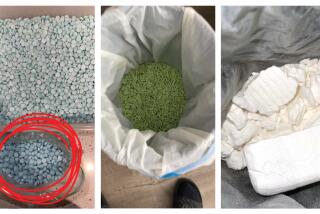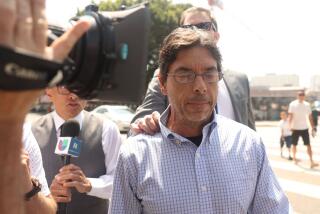Jury deciding whether doctor sold prescriptions
- Share via
There was the testimony from undercover Drug Enforcement Administration agents who said Dr. Masoud Bamdad indiscriminately sold them prescriptions for powerful painkillers in exchange for cash.
There was the grieving father, who said Bamdad gave his drug-addicted son the final fix that led to his death.
But one of the most dramatic moments in the San Fernando Valley physician’s trial on illegal drug distribution charges came when he had to decide whether to take the witness stand in his own defense.
“You pretty much have to decide now,” U.S. District Judge George H. Wu, told the defendant moments before lawyers were scheduled to make their final arguments.
After a hushed but intense-looking conversation between the defendant and his attorney, the lawyer announced, “Your honor, Dr. Bamdad will take the stand.”
What ensued was an unusual courtroom showdown in which the doctor, given great latitude by Wu, accused federal authorities of entrapping him, said one of the prosecution’s expert witnesses had been addicted to Vicodin and blamed the parents of a former patient who had overdosed for causing their son’s death.
Bamdad, 55, is accused of selling prescriptions for OxyContin and its generic equivalent, oxycodone, to drug- addicted patients who he knew had no legitimate need for the medication, including one patient who later died as a result.
Assistant U.S. Atty. Stephanie Christensen portrayed him as a corrupt physician who called patients addicts to their faces, “then took their cash and put it in his pocket right there in the examination room.”
To support that claim, prosecutors played audio and videotapes made by undercover DEA agents posing as patients in which Bamdad chided them for being hooked on drugs, did not appear to do any meaningful physical exam and then gave them a prescription.
The case went to the jury for deliberations Friday afternoon.
On the witness stand Thursday, Bamdad, a distinguished-looking man with salt-and-pepper hair, a goatee and glasses, said that when it came to writing prescriptions for painkillers, his philosophy was simple: “If they have pain, I give them,” he said, in a voice thickly accented by his upbringing in Iran, where he attended medical school.
Though he testified at one point that he could tell what was wrong with a patient “95% of the time” just by looking at them, he could not discern whether someone was pretending to be in pain to score drugs for recreational use.
His patients, he said, are “very good looking. Beautiful girls, beautiful boys. I don’t know who is drug addict unless they tell me.”
As the questioning by Christensen wore on, it became testy, even combative.
When the prosecutor referred to Bamdad’s “customers,” he cut her off.
“They are not customers. They are patients. I don’t run 7-Eleven,” he said.
Though witnesses are supposed to respond to questions asked by lawyers when testifying, Bamdad often spoke at length on matters he was not asked about.
At one point, he assailed the DEA for entrapping him, raiding his house in search of “treasure” and coaching witnesses to lie against him. He also blamed the parents of a 23-year former patient who died of an overdose last year of being “negligent.”
The coroner determined that the young man died of an overdose of Roxicodone, the same type of drug that Bamdad had prescribed him.
--
More to Read
Sign up for Essential California
The most important California stories and recommendations in your inbox every morning.
You may occasionally receive promotional content from the Los Angeles Times.











